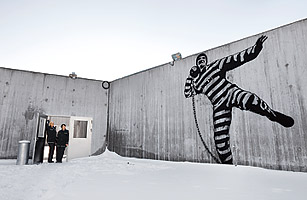
By the time the trumpets sound, the candles have been lit and the salmon platters garnished. Harald V, King of Norway, enters the room, and 200 guests stand to greet him. Then a chorus of 30 men and women, each wearing a blue police uniform, launches into a spirited rendition of “We Are the World.” This isn’t cabaret night at Oslo’s Royal Palace. It’s a gala to inaugurate Halden Fengsel, Norway’s newest prison. Ten years and 1.5 billion Norwegian kroner in the making, Halden is spread over 75 acres of gently sloping forest in southeastern Norway. The facility boasts amenities like a sound studio, jogging trails and a freestanding two-bedroom house where inmates can host their families during overnight visits. Unlike many American prisons, the air isn’t tinged with the smell of sweat and urine. Instead, the scent of orange sorbet emanates from the “kitchen laboratory” where inmates take cooking courses. “In the Norwegian prison system, there’s a focus on human rights and respect,” says Are Hoidal, the prison’s governor. “We don’t see any of this as unusual.” Halden, Norway’s second largest prison, with a capacity of 252 inmates, opened on April 8. It embodies the guiding principles of the country’s penal system: that repressive prisons do not work and that treating prisoners humanely boosts their chances of reintegrating into society. “When they arrive, many of them are in bad shape,” Hoidal says, noting that Halden houses drug dealers, murderers and rapists, among others. “We want to build them up, give them confidence through education and work and have them leave as better people.” Countries track recidivism rates differently, but even an imperfect comparison suggests the Norwegian model works. Within two years of their release, 20% of Norway’s prisoners end up back in jail. In the U.K. and the U.S., the figure hovers between 50% and 60%. Of course, a low level of criminality gives Norway a massive advantage. Its prison roll lists a mere 3,300, or 69 per 100,000 people, compared with 2.3 million in the U.S., or 753 per 100,000 — the highest rate in the world.